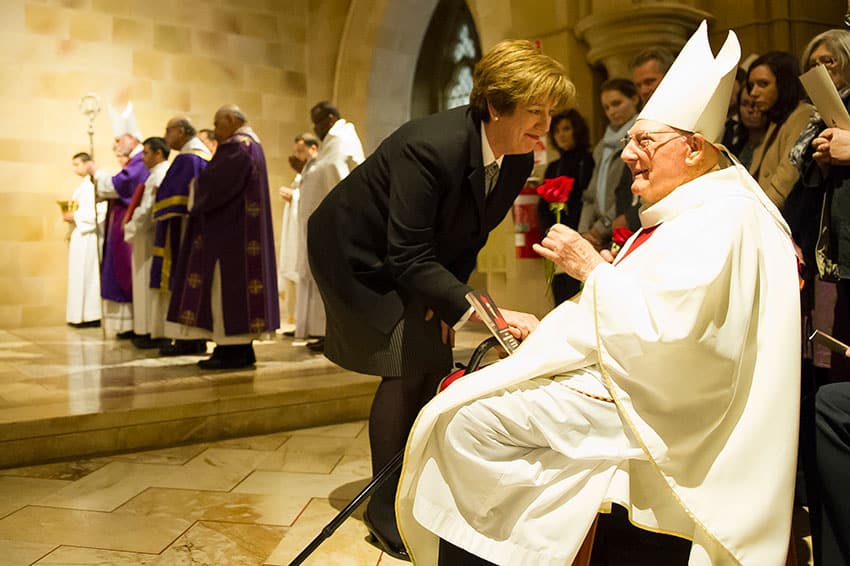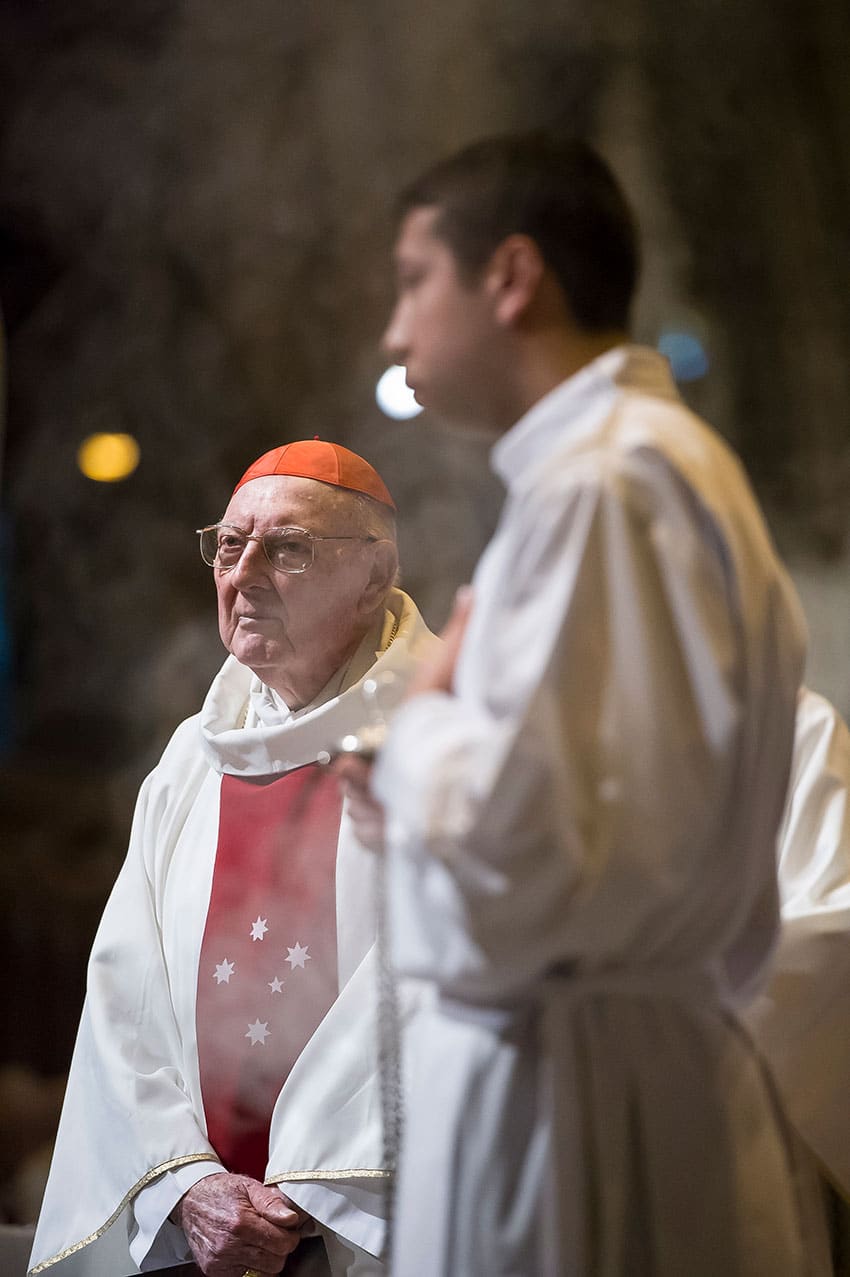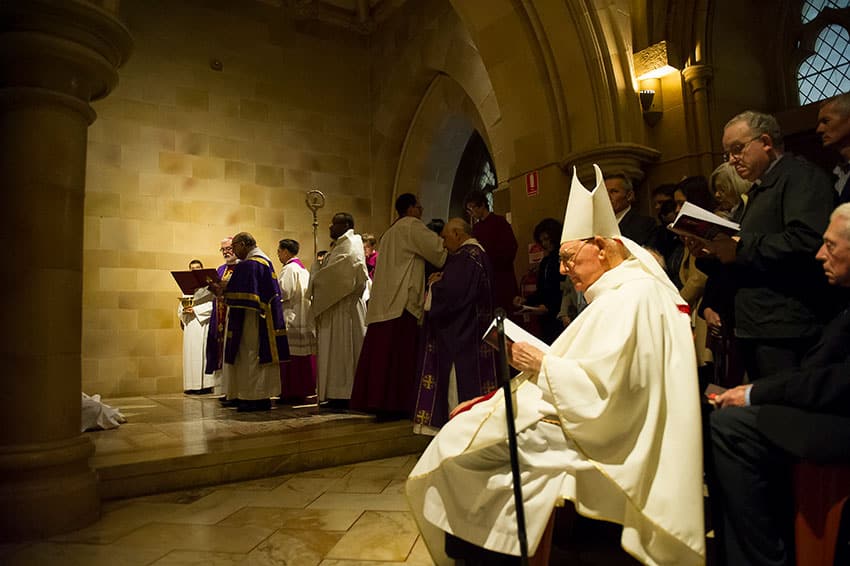
Archbishop Anthony Fisher OP has paid tribute to Australian Cardinal Edward Idris Cassidy, who spearheaded ecumenical and interfaith efforts for the Church under Pope John Paul II.
The cardinal died, aged 96, in Newcastle on 10 April.
The funeral is expected to be held at St Mary’s Cathedral but a date has not yet been set.
“I was particularly saddened by the news today of the death of Cardinal Edward Cassidy at the age of 96,” Archbishop Fisher said on Saturday after hearing the news.
A remarkable legacy
“This Sydney-born cardinal left a remarkable legacy on our Church, especially in the field of ecumenism during the pontificate of Pope John Paul II when he served as President of the Pontifical Council for the Promotion of Christian Unity.
“He led some wonderful initiatives in the 1990s which nurtured unprecedented dialogue between our Church and fellow Christians and he also helped lead historic progress in dialogue with non-Christian faiths.
Archbishop Fisher said Cardinal Cassidy was a talented canon lawyer and diplomat, serving as Apostolic nuncio in Ireland, El Salvador, Argentina, Taiwan, Bangladesh, South Africa, Burma, Lesotho, the Netherlands and India.

A profound impact
“Few other Australians have had such a profound impact on the Catholic Church on the international stage and I’m sure he will continue to inspire church leaders for many years to come.
“Cardinal Cassidy was a most charming man and put that mix of charm and faith to very good use in service of the Church’s diplomatic missions and ecumenical efforts. He was always most encouraging to me as a young bishop. May he rest in peace.” he said.
Cardinal Cassidy was for many years the most senior Australian to have worked in the Vatican.
Ecumenism is a priority – not a ‘specialisation’
At the time of his death he was the President Emeritus of the Pontifical Council for Promoting Christian Unity and had also headed the Vatican’s Commission for Religious Relations with Jews, charged with the especially sensitive conduct of the Church’s relationship with the Jewish people.
From Lutherans to Anglicans to Orthodox churches and the Anglican Communion he also oversaw and directed the Vatican’s relations with others faiths and denominations around the world.
“How can we be at rest when we see that church we love wounded in its catholicity, unable to be the church that our Lord wants it to be?” he asked in 1993 at the opening of a six-day Vatican meeting of leaders of ecumenical commissions, declaring that ecumenism is a Church priority and not just an area of specialisation for interested individuals.

Listening to other voices
He was a strong and persistent supporter of the work of diocesan and national ecumenical commissions, which he regarded as essential at the grass roots level for educating Catholics in ecumenism and helping set guidelines for ecumenical formation in seminaries.
He also encouraged those involved in the work of ecumenism to invite representatives from other churches to participate in important Church activities – including synods, meetings and liturgical events – in their dioceses and at a national level.
Involving other Christians in events such as Church synods and inviting them to make their own contributions was a persistent theme throughout his career, which he described as “a concrete commitment to concrete ecumenism.”
‘Catholics need to do more’
Towards the end of his term in office he told the Synod of European bishops in 1999 that Catholics needed to take progress towards religious unity more seriously.
However, “the number of those not so convinced is still an obstacle to further progress.” he said.
He also remained realistic about the difficulty of pursuing Christian unity, cautioning that Catholics needed to be patient, finding instruction and consolation in the Gospel story of the Apostles fishing all night without a bite.
Ecumenists often find themselves in a similar situation, he said.
“We toil and yet we do not always see any real progress,” he told participants in 1992 during ceremonies marking the end of a year-long ecumenical celebration in Sweden of the 600th anniversary of the canonisation of St Bridget, a saint honoured by Catholics and Lutherans in that country.
A cardinal’s call: Catholics must convert to Ut Unum Sint
He consistently called called for the resumption of official Catholic-Orthodox talks which had been halted a decade earlier, pointing out that valuable time was being wasted on issues that were more practical than theological.
He strongly supported Pope John Paul II’s 1995 encyclical Ut Unum Sint which called for Christian unity and invited Christian theologians and leaders of other churches to explore with the pope how he might exercise his primacy as bishop of Rome in ways that might better serve the unity of all the churches.
“I have no hesitation in claiming that the encyclical Ut Unum Sint has made a valuable contribution to the ecumenical movement,” Cardinal Cassidy said after its release. However, he added, “there is still much work to be done within the Church of Rome before Pope John Paul’s vision of the ecumenical commitment is fully shared by all the members of his church.”
In 1999, he was dispatched bearing a personal letter from Pope John Paul II as his personal representative to the dying Patriarch of the Armenian Apostolic Church, Catholicos Karekin of Etchmiadzin; both the Cardinal and the-then pope had been close to the Patriarch, especially in ecumenical affairs.
He was made a cardinal by St John Paul II in 1991, after having spent most of his career in the Vatican’s diplomatic corp.
A career that almost never happened
However, his career as a top official of the Catholic Church almost never happened.
As a high school student in Parramatta a local priest discouraged him from entering the seminary because he had not completed his secondary education and had not been a student in a Catholic school.
Leaving school, and with Australia caught up in the global conflict of World War II, he worked for the NSW public service before deciding to argue his case for acceptances as a candidate for the priesthood to Sydney Archbishop Norman Gilroy. The gamble paid off: The Archbishop accepted him and he entered the seminary in 1943.
Ordained alongside him in 1949 was Edward Clancy, who would go on to become the Archbishop of Sydney from 1983 to 2001 and who, like him, would one day be appointed a cardinal by Pope John Paul II.
From Wagga priest to Vatican diplomat
Initially stationed in the Diocese of Wagga he was sent to Rome to study Canon Law in 1952. He joined the Vatican diplomatic service in July 1955, spending nearly 30 years as a Vatican diplomat in Asia, Europe, Latin America and Africa.
He was later appointed to the Secretariat of State, where he served for almost two years in a role equivalent to the Pope’s chief of staff.
He was named president of the Pontifical Council for Promoting Christian Unity in 1989 and elevated to the rank of cardinal in 1991. He retired from the Pontifical Council in 2001 at the age of 76.
Cardinal Cassidy was appointed a Companion of the Order of Australia (AC) in 1990 in “recognition of service to religion and to international affairs”.
Australian Catholic Bishops Conference President Archbishop Mark Coleridge said Cardinal Cassidy’s friendly and down-to-earth style were among his hallmarks while serving at the Vatican.
While Cardinal Cassidy was highly regarded for several reasons, it was at the Pontifical Council for Promoting Christian Unity that he “shone”, Archbishop Coleridge said.
“Cardinal Cassidy showed not only diplomatic skill and political astuteness, but also human authenticity and common sense,” he said.
“There was a simplicity in it all – the simplicity of a man called to high office in the Church but with his eyes firmly on Jesus Christ.”
Related
